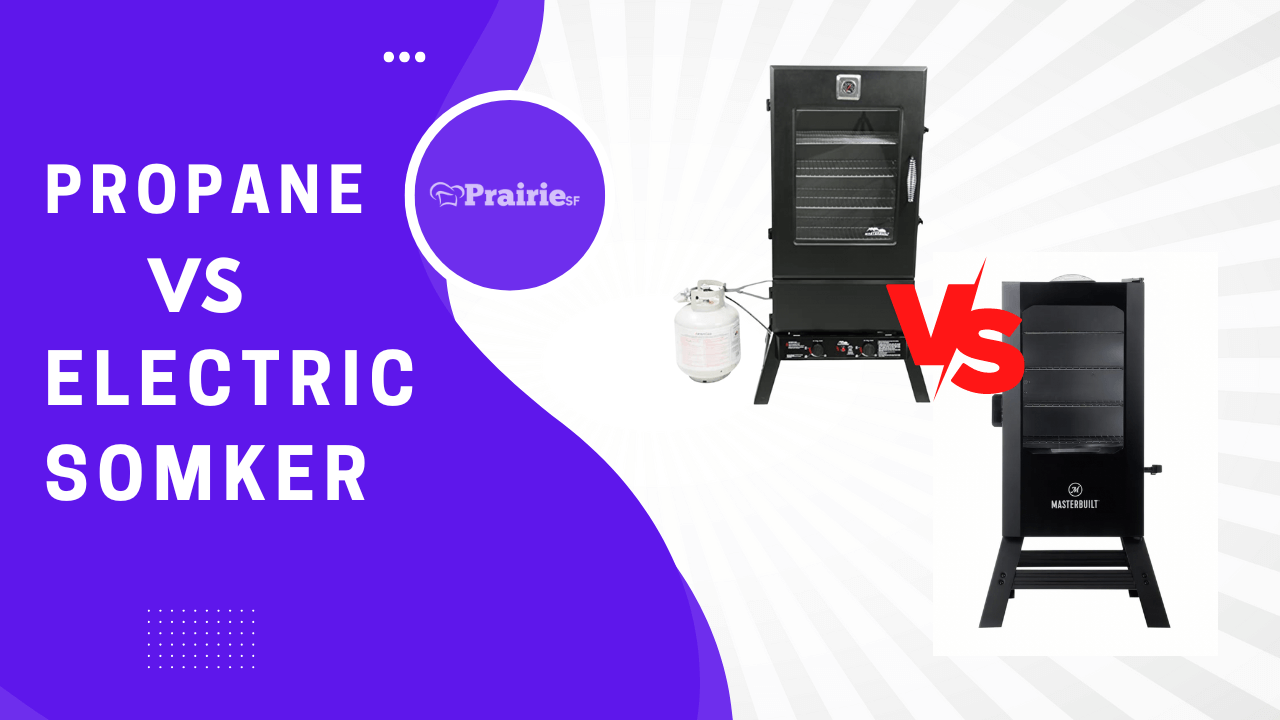If you enjoy smoked meats, you’ve probably thought about using a propane or electric smoker. Both offer advantages and disadvantages, but which is best for you? Learn about the distinctions between electric and propane smokers if you’re seeking a budget-friendly, simple-to-use smoker. In the world of barbecue, grilling, and smoking, fuel sources are a subject of unending argument, pontification, and controversy.
Although smoking is a traditional culinary technique, modern smokers can produce the same mouthwatering results, enabling any home cook to prepare meals that would impress restaurant chefs. Electric and propane-powered meat smokers are two of the most widely used types.
Nowadays, most of us like smoking, whether for homemade bacon or hosting family and friends for ribs and pulled pigs. Making the right smoking product choice can require a significant financial and time commitment. By outlining some of the most significant distinctions between the two types of smokers, we’ll help you choose between propane and electric smokers.
Contents
Propane Smokers
Have you ever seen upscale gas smokers being used for barbecue at restaurants? Those smokers use propane. A propane smoker is an excellent substitute for an electric or conventional charcoal smoker. A propane burner produces the heat required for smoking, baking, and roasting at the bottom of a vertical grill called a propane smoker. The term “gas smoker” is also used to describe the propane smoker. Like other smokers, they employ a heating element to cook food within a specific temperature range. Typically, the range is 225–250°F.

Pros
Cons
Electric Smokers
Electric smokers are set up quite similarly to smokers that use propane. Electric smokers must be plugged into an electrical outlet to prepare or heat meals inside the smoker. This one is more modern than conventional smokers that use charcoal, wood chips, etc. An electric smoker often has a smaller temperature range than a propane smoker.

You’re only going to reach a maximum temperature of around 270°F, depending on the brand and model. They aren’t especially portable and shouldn’t be used in the rain because they require a plug-in electrical connection. A water pan and a wood chip bin are features found on many of the more expensive electric smokers. These water pans aid in preserving the ideal levels of moisture in your meat and the cooking environment.
Pros
Cons
Difference Between Propane And Electric Smokers
If you’re having trouble picking between an electric or Propane smoker, let us discuss some key differences between the two, which will help you choose the perfect smoker.
-
Taste
Generally, a propane smoker will provide taste profiles more like those produced by wood or charcoal than an electric smoker. Naturally, flavor should be among the top considerations when purchasing a smoker.
Despite the fact that everyone has distinct preferences, professionals frequently choose propane since it yields results that are comparable to those of charcoal smoking. Since they burn real wood, propane smokers will likewise impart the desirable smoke ring to meat. Propane cooking can improve your backyard BBQ and is quick, safe, and effective.
-
Ease Of Use
Compared to other types of cookers, both are simple to use. If you are unfamiliar with temperature settings, an electric smoker is an ideal option because all of the temperature settings are displayed on the device. All you need to do is set the desired temperature, unwind, and let everything else take care of itself!
Additionally, you will need to regulate your gas flow and check the temperature frequently while using a propane smoker. So, if you have access to power in your backyard, on your deck, or rooftop, an electric smoker is your great decision for ease and convenience even if you’ve never smoked anything before.
-
Cost
Electric and propane smokers are also reasonably priced. A gas smoker often costs less to buy than an electric one. The most affordable gas models are fairly reasonable but beware of quality. While it is difficult to say with certainty which is more cost-effective to run (since gas and power prices vary from place to place), an electric smoker is typically more cost-effective.
-
Versatility And Temperature Range
An electric smoker’s best feature is that you can use it to cold-smoke things like cheese and nuts. The heating elements don’t, however, reach very high levels.
However, a propane smoker heats up quite rapidly, reaches high heat temperatures sufficient to roast meat, and absorbs a fantastic flavor profile. However, they are not the best for smoking cold.
The temperature range of a propane smoker is wider than that of an electric smoker. The temperature range of a propane smoker is 150 to 400 degrees Fahrenheit, whereas the temperature range of an electric heating element is 100 to 275 degrees.
A propane smoker is undoubtedly more adaptable than an electric smoker, giving you more culinary options. Although electric smokers have their limitations, an electric cooker is a safe bet because smoked food only requires low heat.
-
Weather Conditions
When purchasing a smoker, one thing to consider is what would happen if it begins to rain. Smokers are utilized outside, exposed to the elements and bad weather. Since they are poorly insulated and lose a lot of heat, propane smokers may not function as well as they could in very cold climates. As a result, the smoking process takes longer and uses more gas.
Whatever the case, even electric smokers need to be shielded from moisture and precipitation in some sort of cage. Gas or electricity are both suitable options if you reside in a dry, moderately cold area. Gas is suggested for moist environments, whether it’s raining or snowing.
-
Maintenance And Cleaning
Both kinds of units are comparatively simple to clean. The dishwasher or sink can be used to wash the removable racks. When compared to its charcoal cousins, cleaning an electric or propane type is relatively comparable and easy. On the other hand, cleaning propane machines can be a little trickier. The amount of fat that falls down is greater than if you had used electricity because of the tremendous heat, fuel consumption, and smoke.
Both produce ash that needs to be disposed of, and grease gathers in drip pans. You’ll discover that an electric smoker creates less soot than a gas-powered one. There won’t be much in either, though, due to the low temperatures and clean sources of heat.
-
Portability
An electric smoker’s drawback is that it needs to be connected to an outlet or a socket. You can only use your smoker in certain areas of your own backyard since you must keep it close to an electrical outlet. And if it starts to rain? Because water and electricity don’t mix well, you must be in a covered location.
Forget to take an electric smoker anywhere. An electric smoker is much more difficult to transport than a propane smoker. Smokers that use propane can operate without an outlet. That means you may set up shop wherever you wish in your backyard, perhaps next to a spot where you can unwind under a leafy tree while taking care of your business. Furthermore, you can bring a propane smoker along with you when you go camping or have a large family gathering at a state park.
Propane Vs Electric Smoker Who Is The Winner?
It’s true that it’s difficult to determine who will win. You should make your decision based on your personal needs rather than on which is stronger. The cooking temperature monitoring, heating time, placement location, etc. are the main distinctions between an electric and a propane smoker. A propane smoker is unquestionably the best option for you if you want something portable, doesn’t take a long time to heat up, and gives your food the most delectable, smoky flavor.
An electric smoker is a right choice if you’re a novice smoker searching for a simple-to-use smoker that allows you the ability to change temperatures quickly. Choose propane if you want a device that can smoke your food fast and provide results comparable to charcoal, but be ready to watch over your smoker and adjust the temperature frequently.
An electric smoker is your best option if you want just to set it and forget it when smoking more delicate meats. It all depends on your particular preferences, and any smoker can provide a fantastic smoking experience. Also, you can use all of the facts mentioned above to guide your choice.

